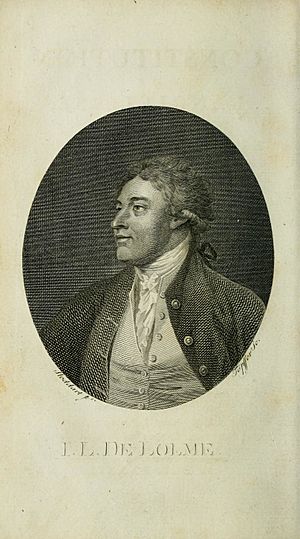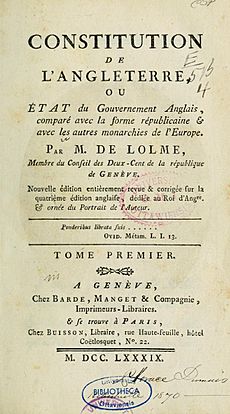Jean-Louis de Lolme facts for kids
Quick facts for kids
Jean-Louis de Lolme
|
|
|---|---|

From Constitution de l'Angleterre (1789)
|
|
| Born | 1740 Geneva |
| Died | July 16, 1806 (aged 65–66) Seewen, Canton of Schwyz |
| Occupation | Political theorist; writer on constitutional matters |
| Language | French |
| Nationality | Genevan and English |
| Notable works | Constitution de l'Angleterre (The Constitution of England, 1771) |
Jean-Louis de Lolme (born 1740, died 1806) was a smart thinker from Geneva, a country that was independent back then. He wrote a lot about how governments should work, especially about constitutions. Later, he moved to England and became a British citizen.
His most famous book was called The Constitution of England (written in 1771). It was first in French, then came out in English too. In this book, he said that a good government should have a constitution. He believed that power should be balanced between a king or queen (monarchy), rich noble families (aristocracy), and the common people (democracy). He also liked how the English system had 'representative democracy.' This means people vote for others to represent them. He even thought more people should be allowed to vote (this is called suffrage). His ideas helped shape the United States Constitution.
Contents
Early Life and Challenges
Jean-Louis de Lolme was born in Geneva in 1740. He studied to become a lawyer and started practicing law. However, he wrote a pamphlet called Examination of Three Parts of Rights. This pamphlet upset the people in charge of Geneva.
Because of this, he had to leave his home country. He found safety in England. For many years, he lived there with very little money. He earned just enough by writing for different newspapers and magazines.
Writing About Government
While living in England, de Lolme spent a lot of time studying the English constitution. A constitution is a set of rules that a country's government must follow. He wrote down what he learned in his famous book, The Constitution of England, which came out in 1771.
An updated English version of the book was published in 1775. Many people found his book interesting. It had many clever ideas about why the English constitution worked so well compared to others.
Balancing Power
In his book, de Lolme argued for a government where power is balanced. He believed that a government should share power among different groups. These groups included the king or queen (monarchy), the wealthy noble families (aristocracy), and the common people (democracy). He thought this balance stopped any one group from becoming too powerful.
He famously said that the British parliament "can do everything but make a woman a man and a man a woman." This meant parliament had a lot of power, but not unlimited power. De Lolme admired the British government. He felt its unwritten constitution was a great example of balanced government.
Democracy and Voting
De Lolme especially liked the idea of representative democracy in the English system. In this type of democracy, people vote for others to speak for them in government. He also pushed for more people to have the right to vote, which is called suffrage.
He disagreed with another famous thinker from Geneva, Jean-Jacques Rousseau. Rousseau believed in direct democracy, where everyone votes on every issue. De Lolme thought Rousseau's ideas were not realistic. De Lolme also wrote other books, like A Parallel between the English Government and the Former Government of Sweden (1772).
Later Life
By 1775, de Lolme needed help from a charity to return to his home country. He passed away in a village called Seewen, in Switzerland, on July 16, 1806.
De Lolme's Lasting Impact
De Lolme's book, The Constitution of England, was very important. It helped many thinkers of his time understand the English constitution. It was even used like a political pamphlet to spread ideas.
His work greatly influenced the Founding Fathers of the United States Constitution. These were the people who created the American government. John Adams, one of the Founding Fathers, praised de Lolme's book. He called it one of the best books ever written about how governments should be set up. Some people also believe de Lolme's ideas influenced the Constitution of Norway.
Images for kids
 | Bessie Coleman |
 | Spann Watson |
 | Jill E. Brown |
 | Sherman W. White |




